| | | OFFLINE | | Post: 17.730
Post: 401 | Registrato il: 28/08/2005
Registrato il: 20/01/2009 | Administratore | Utente Senior | |
|

 GENERAL AUDIENCE TODAY
GENERAL AUDIENCE TODAY
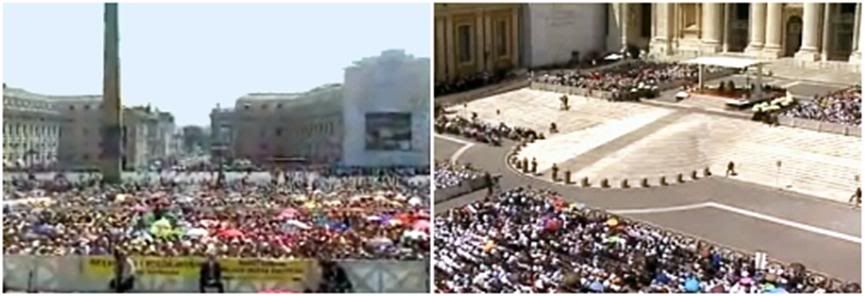
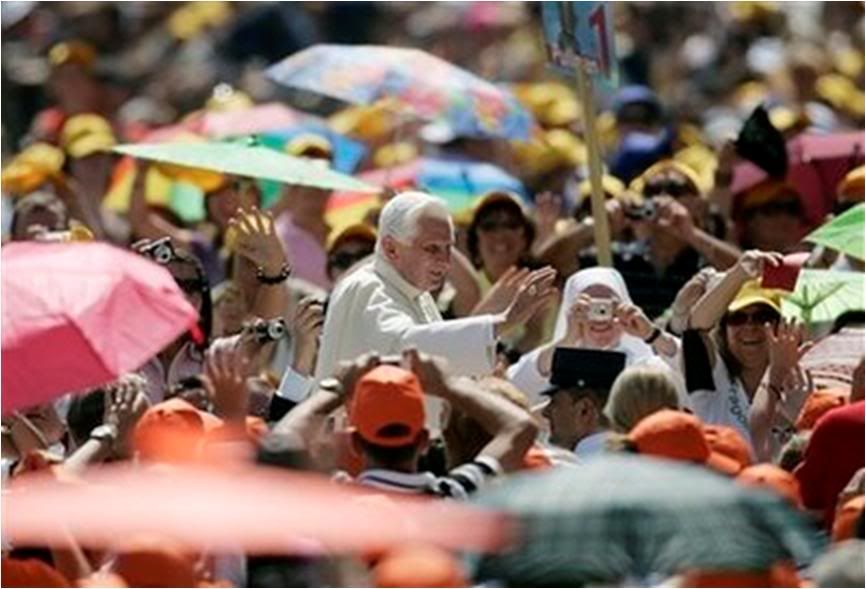
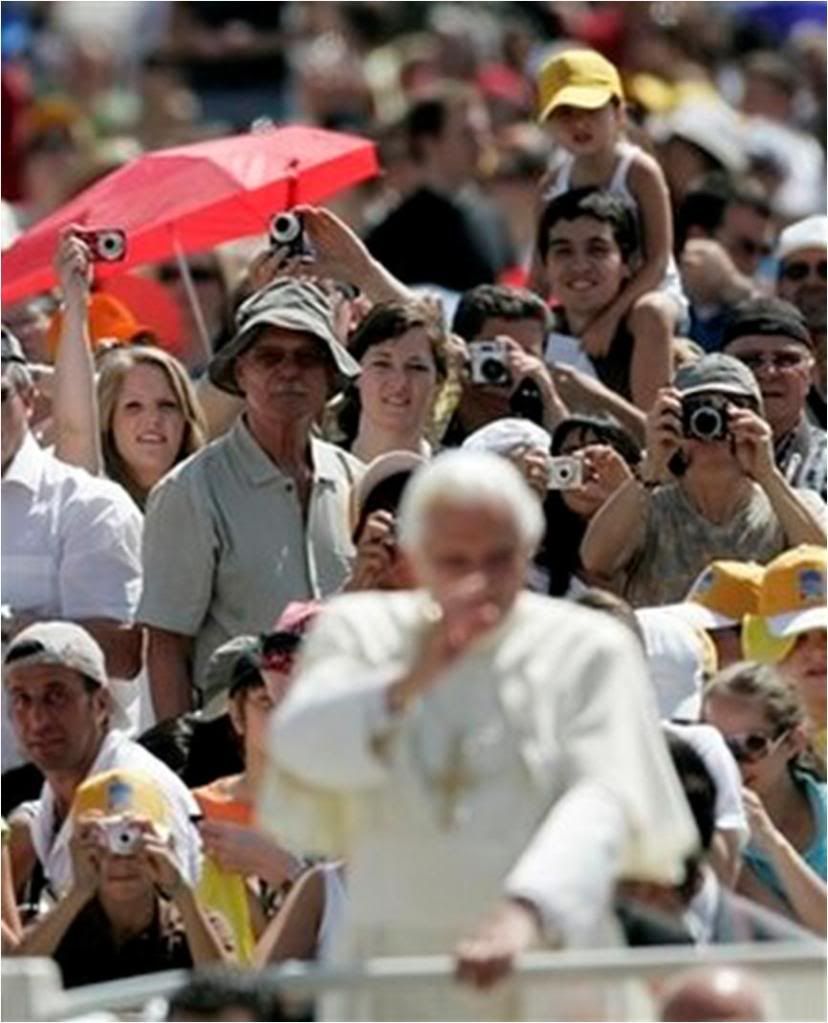
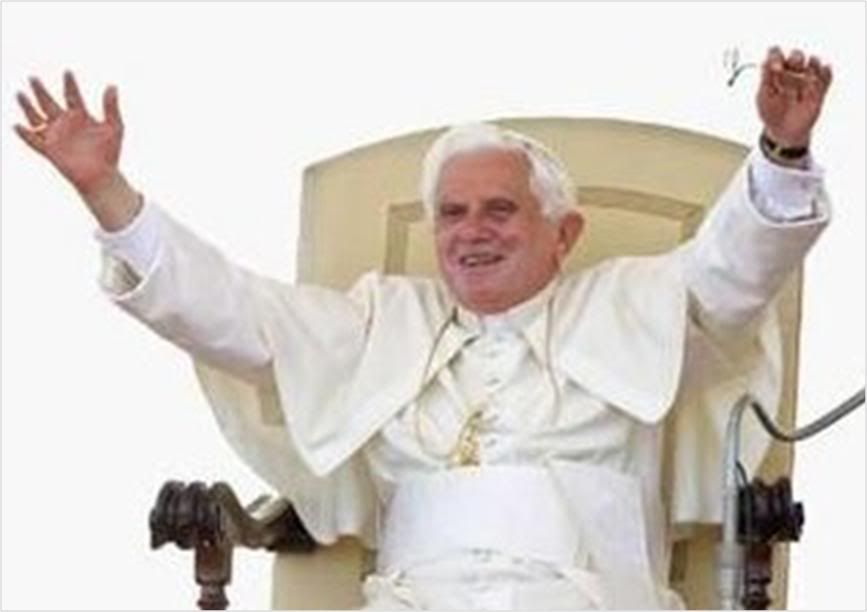 Here is what the Holy Father said in English today:
Here is what the Holy Father said in English today:
As we continue our catechesis on the early Christian writers of the East and the West, we now turn to the brother Saints Cyril and Methodius.
They were born in Thessalonica in the early ninth century. Cyril, whose baptismal name was Constantine, was educated at the Byzantine Court, ordained a priest, and became an acclaimed teacher of sacred and profane sciences.
When his brother Michael became a monk, taking the name of Methodius, Cyril also decided to embrace the monastic life. Having retrieved the relics of Pope Clement I during a mission in Crimea, the brothers successfully preached Christianity to the people of Moravia.
Inventing an alphabet for the Slavonic language, they together with their disciples translated the Liturgy, the Bible and texts of the Fathers, shaping the culture of the Slavic peoples and leaving an outstanding example of inculturation. Pope Adrian II received them in Rome and encouraged their missionary work.
When Cyril died in Rome in 869, Methodius continued the mission in spite of persecution. After his death in 885, some of his disciples, providentially released from slavery, spread the Gospel in Bulgaria and in "the Land of the Rus".
In recognition of the brothers’ vast influence, they were named Co-Patrons of Europe by Pope John Paul II.
May we imitate their strong faith and their Christian wisdom as we bear witness to the Gospel in our daily lives!
I offer a warm welcome to the participants in the 2009 Church Music Festival. I greet the pilgrims from the parishes of Sacred Heart, Dontozidon, Ilapayan and Tuaran from the Archdiocese of Kota Kinabalu, Malaysia, accompanied by Archbishop John Lee, and also the pilgrims from Saint Francis Parish, Singapore. I am also pleased to greet the many student groups, and all the English-speaking pilgrims and visitors.
I extend my greetings to the various religious leaders present today who have gathered in Rome for an International Conference of interreligious dialogue. I commend this initiative organized by the Italian Bishops’ Conference in collaboration with the Italian Ministry of Foreign Affairs.
I am confident that it will do much to draw the attention of world political leaders to the importance of religions within the social fabric of every society and to the grave duty to ensure that their deliberations and policies support and uphold the common good.
Upon all those taking part I invoke an abundance of the Almighty’s blessings.
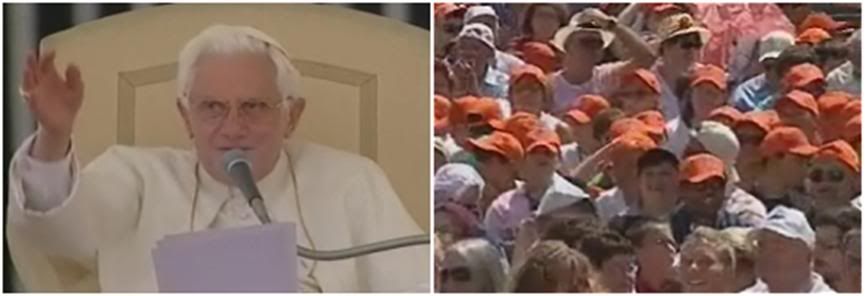
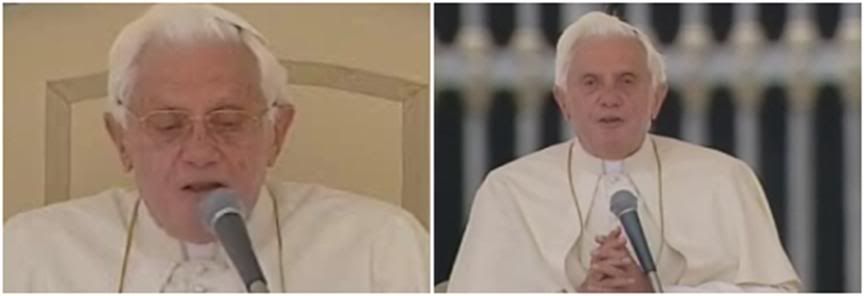
CATECHESIS ON
SAINTS CYRIL & METHODIUS
Dear brothers and sisters,
Today I wish to speak of Saints Cyril and Methodius, brothers in blood and in the faith, called the Apostles to the Slavs.
Cyril was born in Thessalonica to the imperial magistrate Leo in 826/827 as the youngest of seven children. He learned the Slavic language as a child.
At age 14, he was sent to Constantinople to be educated and wsa a companion of the young Emperor Michael III. In those years, various university subjects were introduced, among them dialectics, in which Cyril studied under a master named Fotius.
After turning down a brilliant marriage prospect, he decided to receive Holy Orders and became the librarian of the patriarchate. Shortly thereafter, wishing to retire in solitude, he hid in a monastery, but he was promptly found out, and he was assigned to teach the sacred and profane sciences - a task he carried out so well that he earned the appellative 'Philosopher'.
Meanwhile, his brother Michael (born around 815), after an administrative career in Macedonia, around 850, abandoned the world to become a monk on Mount Olympus in Bithynia, where he received the name Methodius (the monastic name had to begin with the same letter as the baptismal name), later becoming the abbot of the monastery of Polychron.
Attracted by the example of his older brother, Cyril too decided to leave his teaching job to go to Mt. Olympus to meditate and pray. A few years later (around 861), the imperial government gave him a mission among the Khazari near the Sea of Azov, who had requested that they be sent someone literate who would be able to debate with Jews and Saracens (Muslims).
Cyril, accompanied by his brother, stayed quite a time in the Crimea, during which he learned Hebrew. Here, he even searched for the remains of Pope Clement I who had died there in exile. He found the tomb, and when he and his brother left the Crimea, he carried the precious relics with him.
Back in Constantinople, the two brothers were sent to Moravia by Empereor Michael III, who had been specifically requested by the Moravian Prince Bratislaw thus: "Our people, since they rejected paganism, observe the Christian law; but we do not have a teacher who is capable of explaining the true faith to us in our own language".
The mission soon proved to be a success. Translating the liturgy into the Slavic language, the two brothers earned great sympathy among the people.
But this aroused towards them the hostility of the Frankish clergy who had preceded them in Moravia and considered the territory to be under their ecclesiastical jurisdiction.
To justify themselves, the brothers went to Rome in 867. On the way, they stopped in Venice, where they had a spirited discussion with the supporters of the so-called 'trilingual heresy'. The latter maintainexd that there were only three languages with which it was 'legitimate' to praise God - Hebrew, Greek and Latin. Obbviously, the brothers strongly opposed this view.
In Rome, Cyril and Methodius were received by Pope Adrian II, who went in procession to meet them and welcome the relics of Pope St. Clement.
The Pope understood the great importance of their ecclesiastical mission. From the middle of the first milliennium, in fact, the Slavs had settled in great numbers in the territories between the two parts of the Roman Empire, the East and the West, which already had tense relations.
The Pope sensed that the Slavs could be a bridge that could contribute to keeping the unity among Christians from both parts of the Empire. Thus, he did not hesitate to approve the mission of the two brothers to Greater Mroavia, welcoming and approving the use of Slavic for the liturgy.
The Slavic liturgical books were deposited on the altar of Santa Maria Phatme (Santa Maria Maggiore), and the liturgy in Slavic was celebrated in the Basilicas of St. Peter, St. Andrew and St. Paul.
Unfortunately, Cyril became seriously ill in Rome. Sensing that death was near, he wished to devote himself totally to God as a monk in one of the Greek monasteries of the city (probably the one at St. Praxedes). He assumed the monastic name Cyril (his baptismal name
was Constantine).
He asked his brother Methodius, who had meanwhile been consecrated as a bishop, not to abandon the mission to Moravia and to return to the Slavic peoples.
He addressed God in these words: "Oh Lord, my God... hear my prayer and keep faithful to you the flock to whom I would have offered myself... Free them from the heresy of the three languages, gather them all in unity, and make the people you have chosen united in the true faith and in the right confession". He died on February 14, 869.
Faithful to the commitment he had made to his brother, Methodius returned the following year, 870, to Moravia and to Pannonia (now Hungary), where once again, he met with the violent aversion of the Frankish missionaries who imprisoned him.
He did not lose heart, and when, in 873, he was released, he proceeded to function actively in organizing the Church, undertaking the formation of a group of disciples. These disciples must be credited for being able to overcome the crisis unmleashed after the death of Methodius on April 6, 885.
Persecuted and jailed, some of them were even sold as slaves and taken to Venice, where they were ransomed by a Constantinople functionary who allowed them to return to the lands of the Balkan Slavs.
Welcomed in Bulgaria, they were able to continue the mission begun by Methodius, spreading the Gospel in 'the land of the Rus'. God in his mysterious providence thus availed of persecution to save the work of the holy brothers. Literary documentation of their mission has come down to us.
Just think of examples like the Evangelarium (liturgical excerpts from the New Testament), the Psaltery, and various liturgical texts in Slavic on which both brothers worked. After the death of Cyril, we owe Methodius and his disciples, among other things, the translation of the entire Sacred Scripture, the Nomo-canon and the Books of the Fathers.
To summarize briefly the spiritual profile of the two brothers, one must first take note of the passion with which Cyril approached the writings of St. Gregory Nazianzene, learning from him the value of language in the transmission of Revelation.
St. Gregory had expressed the desire that Christ could speak through him: "I am a servant of the Word (made flesh), therefore I place myself at the service of the Word (of God).
Wishing to imitate Gregory in this service, Cyril asked Christ to speak in Slavic through him. He introduced his translations with the solemn invocation: "Listen, all you Slavic peoples, listen to the Word that comes from God, the Word that nourishes the soul, the Word that leads to knowledge of God."
Actually, a few years before the Prince of Moravia asked the Emperor Michael II to send missionaries to his land, it seems that Cyril and his brother Methodius, along with a group of disciples, had already been working on a project to put together Christian teachings in books written in Slavic.
It then became clear that they needed new graphic symbols that were more adapted to the spoken language. Thus was born the Giagolitic alphabet which, modified successively, was eventually called 'Cyrillic' in honor of the man who inspired it. This was a decisive event for the development of Slavic civilization in general.
Cyril and Methodius were convinced that single peoples could not claim to have received the Revelation fully until they had heard it in their own language and read it in their own alphabet.
Methodius has the merit of ensuring that the work undertaken with his brother would not be brusquely interrupted. While Cyril the 'Philosopher' was inclined to contemplation, Methodius carried on an active life.
Thanks to this, he was able to lay the premises for the successive affirmation of what we might call the 'Cyrillo-Methodian idea' which accompanied the Slavic peoples through different historical periods and favored their cultural, national and religious development.
Pope Pius XI acknowledged this with his Apostolic Letter Quod Sanctum Cyrillum, in which he described the two brothers as "sons of the Orient, from the Byzantine nation, Greek by origin, Roman by mission, and Slavic by their apostolic fruits" (AAS 19 [1927] 93-96).
The historic role they played was officially proclaimed by Pope John Paul II who, with the Apostolic Letter Egregiae virtutis viri, declared them co-Patrons of Europe along with St. Benedict (AAS 73 [1981] 258-262).
Inneed, Cyril and Methodius provide a classic example of what is today indicated by the term 'inculturation': every people should find the revealed message in their own culture and express in it the salvific truth with the language that is their own.
This presupposes a work of 'translation' that is very demanding because it requires the specificity of adequate terms in order to re-propose, without betraying, the richness of the revealed Word.
The two brothers have left us a testimony of this that is never more significant, to which the Church still looks today for inspiration and orientation.
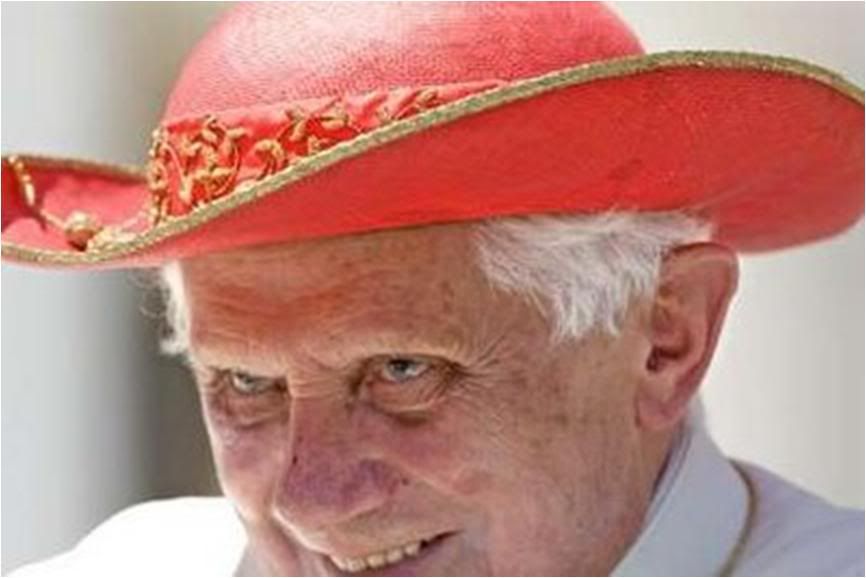
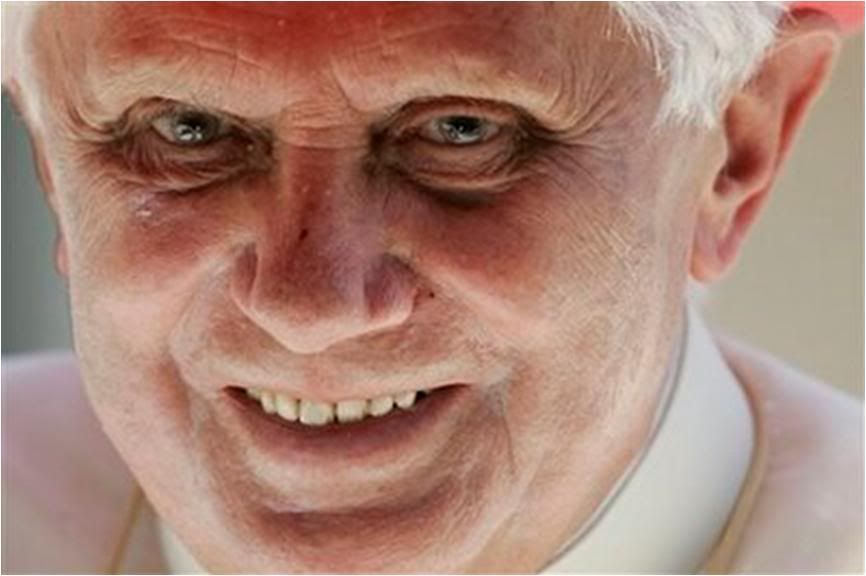 Even the regular agency news photographers are getting to be Spazianis! When was the last time they had such a photogenic 82-year-old?
Even the regular agency news photographers are getting to be Spazianis! When was the last time they had such a photogenic 82-year-old?
[Modificato da TERESA BENEDETTA 17/06/2009 19:04] |